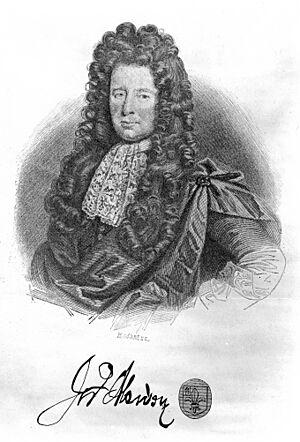Sir John Morden, 1st Baronet facts for kids
Sir John Morden (born August 13, 1623 – died September 6, 1708) was a very successful English merchant. A merchant is someone who buys and sells goods to make money. He was also a philanthropist, which means he gave a lot of money to help others. For a short time, he was even a Member of Parliament (MP). Sir John started Morden College in Blackheath, London. This college was a special home for merchants who had retired. Today, over 300 years later, it still helps people as a charity.
Contents
Sir John Morden's Early Life
Sir John Morden was born in London. His father, George Morden, was a goldsmith. In 1643, young John became an apprentice to Sir William Soame. Sir William was a rich London merchant. He was also part of the British East India Company.
John Morden later joined the Turkey Company. He worked in Aleppo, which is in Turkey. By 1660, he returned to London. He had earned a very large amount of money.
How Sir John Became a Philanthropist
It is said that Sir John loaded all his money onto three ships. He sent them back to England. But the ships did not arrive when expected. This made him very worried. When they finally arrived safely, he was very happy. This experience made him want to help other merchants. He wanted to help those who had faced hard times.
In 1669, he bought Wricklemarsh Manor for £4,200. This large estate was in south-east London. It covered over 250 acres.
Sir John's Public Roles
King James II made him a baronet in 1688. This is a special title. In 1691, he became a Commissioner of Excise. This meant he helped collect taxes for King William III. From 1695 to 1698, he was a Member of Parliament for Colchester.
Founding Morden College
In 1695, Sir John decided to create his own charity. He had spent two years helping at Bromley College. That college was a home for widows of clergy. Sir John and his wife, Susan, spent £10,000 to build Morden College.
What is Morden College For?
Morden College was built as a hospice or almshouse. These are places that offer shelter and care. Sir John wanted to help "poor Merchants." He especially wanted to help those who had "lost their Estates by accidents." This included dangers at sea or other problems. He wanted to help those who had tried their best to earn a living.
The college was built on his Wricklemarsh estate. It was meant to house 40 single or widowed men. Some people think Sir Christopher Wren designed the building. But Edward Strong, a master builder, did most of the work.
Famous Visitors to Morden College
Famous writers visited Morden College. John Evelyn and Daniel Defoe both wrote about it. John Evelyn wrote in his diary on June 9, 1695:
- "Went afterwords to see Sir Jo: Mordens Charity or Hospital on Black-heath now building for the Reliefe of Merchands that have failed, a very worthy Charitye, nobel building."
Daniel Defoe wrote about the college in 1724. He said Sir John Morden wanted to make life comfortable for the merchants. He wanted them to "live like Gentlemen" and "dye so."
Sir John Morden's Legacy
Sir John Morden passed away in 1708. He was 86 years old. He was buried in the Morden College chapel crypt. Statues of Sir John and Lady Susan Morden stand at the front of the college. These statues were made around 1717–1725.
Morden College has grown over the years. It still continues its important charitable work today. In October 2023, a new part of the college, the John Morden Centre, won a big award for its architecture. This award is called the Stirling Prize.
Sir John's name is also remembered in other ways. There are pubs named after him in Greenwich and Lewisham. Some local streets in the Royal Borough of Greenwich also carry his name.
 | John T. Biggers |
 | Thomas Blackshear |
 | Mark Bradford |
 | Beverly Buchanan |


